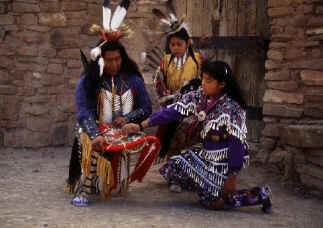Learning
among Traditional Native Americans (TNA)...
ASSESSMENT STRATEGIES

Learning
among Traditional Native Americans (TNA)... |
|

Forward | Objectives |
Introduction | Assessing Needs | Characteristics of TNA Students |
Learning Concepts | Instructional Strategies
| Sample Lesson Plan
|
WHERE DO I START AND END? ASSESSMENT STRATEGIES Before you begin to work with a student, it is helpful to know what that student needs. What are the gaps? Where are the strengths? Assessment must have a clear purpose - to determine best instructional and learning practices. Any other purpose is secondary, and likely, irrelevant. There are many assessment instruments available, but for most Native Americans raised on a Reservation, initial and final assessments are more reliable if they are based on relevant performance. In other words, have the student do something that shows evidence of a needed skill, and use a context that is familiar to that student's environment. To adequately assess students, "find their strengths, see them in their own environment, visit the home, search out the resources they have at home and in their environment. Get to know the students and the family as people." Dr. Robert Rhodes, 2001 Principle - Assessment must be relevant to function. (Assessment for American Indian and Alaska Native Learners. ERIC Digest ED385424 (Publication Date: 1995-09-00) [NOTE: Click on "96/02/26 - List of 91new ERIC Digests" to locate the link to ED385424.]
DISCUSSION WHEEL
APPLICATION 2
Note to Colorado Adult Educators Colorado and other states have developed performance assessments for adult students. Not all performance lessons are relevant to Native American students, but they can be adapted by instructors who are sensitive to their students and their environment. In Colorado, adult educators use the Colorado Certificates of Accomplishment (CCA). Initial assessment and diagnosis is determined by CASAS, a performance-based standardized assessment instrument. For more information on the Colorado Certificates of Accomplishment program and materials, contact one of the State Literacy Resource Centers in Colorado Mary Willoughby, coordinator for the Certificates of Accomplishment process for the state of Colorado, is happy to have you call or write her for more information. Because CCA represents student mastery to employers and other interested agencies in Colorado, it is important for instructors to understand the process thoroughly and comply with the requirements for certification. You may e-mail Mary at willoughby_m@cde.state.co.us, or call her at 303-866-6611. The Longmont Literacy Resource Center also provides training in the CA process. The MPDLP has funded adult educators in Colorado to develop curriculum and lesson plans aligned with the CCA. To access that material, visit http://stars-cwc.cwc.cc.wy.us/Colorado/ , or contact RECO, and we will make sure you get the materials. Click to continue |
|
|